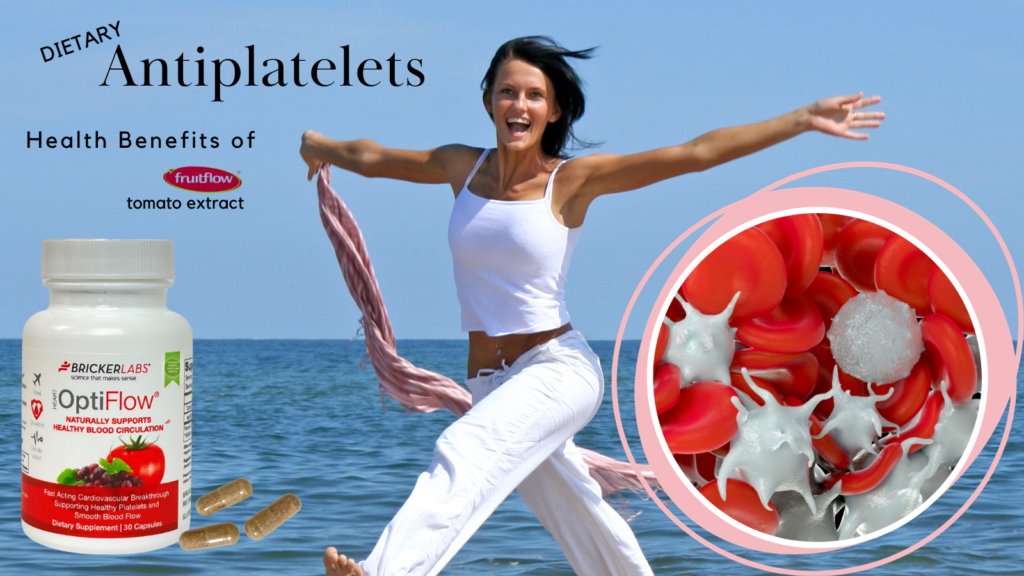
This blog explores the potential new uses of dietary antiplatelets, particularly in reference to Fruitflow®, the primary ingredient in OptiFlow® by Bricker Labs®.
Dietary antiplatelets outside the field of cardiovascular health
Platelet functionality has undergone a sea change in the last decade. Platelets are no longer simply regulators of hemostasis. They are now known to be pivotal in coordinating the inflammatory and immune responses. Clearly, this expanded role offers better opportunities. It allows for the effective management of various health conditions, specifically by targeting platelet activation and their interactions with other vascular cells. Additionally, dietary antiplatelets provide a nutritional approach that is both effective and safe for general use.
Unveiling Platelets Role
Platelets play a key role is maintaining blood’s homeostasis and preserving vascular system integrity. These small cell fragments, devoid of a nucleus, feature an array of receptors on their surface. When activated, they release signaling molecules. To illustrate, they are highly responsive to various stress signals encountered by blood vessels. Nevertheless, at times, this heightened sensitivity can occasionally result in certain platelets within the bloodstream becoming excessively reactive. This reaction is in response to their immediate environment, including the blood and blood vessel walls. This, as a consequence, can contribute to health-related issues. [1,2].
The most extensively researched example centers on platelet influence in the development and progression of cardiovascular disease (CVD). Antiplatelet therapy has long served as a cornerstone in the treatment of established CVD. Additionally, platelets play a crucial role in immune responses and host defenses. Recent studies have proposed that the blood clotting and immune systems are intricately intertwined, rather than functioning as separate entities. [3].
As we gain a better understanding of the critical role platelets play in inflammation and immune responses [4], it becomes evident that controlling platelet-driven inflammation is vital in various diseases, not limited to CVD. Recent studies have shown that medications preventing platelet aggregation can reduce mortality in infections and sepsis [5]. However, these drugs are not intended for primary prevention. Instead, they typically target a specific aspect of platelet aggregation, bringing it to a complete halt. This level of platelet suppression is associated with a higher risk of bleeding, where the potential for bleeding outweighs the benefits of antiplatelet treatment.
Assessing Plant-Derived Dietary Antiplatelets
Nutritional approaches to reducing platelet hyperactivity hold significant appeal. Several plant-derived antiplatelets, such as pycnogenol from pine bark [6], sulfur derivatives from garlic [7], and well-studied flavonoids from onion, grapes, olive oil, and berry anthocyanidins [8], are commercially available. While these are primarily promoted for their antioxidant properties and show some ability to reduce platelet activity [9], there is actually no coherent data about how effective they are as antiplatelets.
Fruitflow®: Active Components, Mechanisms of Action, Efficacy, and Safety
Fruitflow® is derived from ripe tomatoes using a process that removes pomace, seeds, and fats while operating at low processing temperatures (~40 ◦C [10, 11, 18-24]). So, it’s a water-soluble extract without lycopene, and its composition is designed to closely resemble fresh clarified tomato juice as much as possible. The process undergoes further refinement to eliminate polysaccharides and soluble sugars, which constitute the majority of its solid content. These said solid components lack the ability to inhibit platelet aggregation. FruitFlow, is the yield of such intricate process. It offers a diverse array of nucleotides and nucleosides (including adenosine, cytidine, guanosine, AMP, GMP, and deoxy derivatives). Additionally, it includes a wide range of simple phenolic compounds (such as caffeic and ferulic acids, glycosides, and conjugates with quinic acid), as well as a variety of flavonoid derivatives, with a notable prevalence of quercetin derivatives.
Fruitflow® is a standardized representative of the three primary types of dietary antiplatelet compounds: nucleosides, phenolic derivatives, and flavonoid derivatives. It also includes the total amount of “bioactive extract.” The effects of Fruitflow® demonstrated in ten studies focused on platelet aggregation and hypertension [11] and have been shown to affect many aspects of platelet function such as immobilization and signaling; thrombin generation, affects platelets approximately one third as strong as aspirin and does not dangerously elevate the bleeding time in the manner that aspirin does [14].
Fruitflow® Explained Further
Fruitflow® is water-soluble tomato extract dietary antiplatelets. It contains a range of tomato-derived secondary metabolites,
including nucleosides, phenolic conjugates, and polyphenols, all of which show different profiles of antiplatelet activity [10]. The compounds present are all water-soluble and of low molecular weight; Nucleosides are absorbed from the upper gastric tract very quickly upon ingestion, whereas others flavonoid glycosides are absorbed either from the lower small intestine or after microbial interaction in the proximal colon. The different metabolic fates of the antiplatelet compounds result in antiplatelet effects, which are observable 1.5–3 h after ingestion and persist (from a single dose) for around 18 h [10]. When consumed daily, the effects are continuous [11].
Fruitflow® helps maintain normal platelet aggregation, which contributes to healthy blood flow [17]. It was previously summarized the body of work related to Fruitflow®’s effects on platelet aggregation, most of which was conducted in the context of cardiovascular health [11]. This post focuses on the use of Fruitflow® as dietary antiplatelet for inflammation response and immune function.
Dietary Antiplatelets in Inflammation
Platelets, release substances that can cause inflammation. Some of these substances affect how other immune cells and the lining of blood vessels respond to inflammation. Additionally, platelets act as bridges between different immune cells and blood vessel linings. Indeed, they play a crucial role in coordinating the body’s response to injury or disease. [25,26]
While this response is usually helpful, overly active platelets can also cause problems. This particularly, can lead to excessive inflammation and subsequently can damage tissues. It can also worsen conditions like atherosclerosis, diabetes, or inflammatory bowel disease. To manage this, physicians frequently prescribe antiplatelet medications.
Exercise-Induced Inflammation
Regular exercise is associated with overall well-being, correlated to longer life, better mental health, less metabolic issues, strong bones, and improved cardiovascular fitness [39]. While exercise is generally beneficial, strenuous exercise is associated with an increased risk of vascular thrombotic events and sudden death.[33]. Intense exercise can lead to the release of adrenaline and serotonin and triggers the production of thrombin, which activates platelets. In addition, vigorous aerobic exercise can reduce the production of nitric oxide (NO), a substance crucial for preventing blood clotting. This is more prevalent to individuals unaccustomed to such strenuous activity, as the cells responsible for NO production receive diminished oxygen supply. Hyperaggregability develops, and platelets then coordinate a series of pro-inflammatory events.[42].
Most dietary antiplatelets, however, do not directly affect thrombin generation. Fruitflow® on the other hand reduces TF binding to P-selectin, thus reducing platelet-generated thrombin release, it also directly reduces the platelet response to circulating thrombin.
Dietary Antiplatelets in Immunity
Platelets play a vital role in responding to inflammation in the body. They are known to initiate and modify the immune response. In other words, platelets can recognize and absorb harmful microorganisms, and they influence the behavior of immune cells. Hence, making them more effective at clearing infections. In situations where tissue damage is caused by blood-borne pathogens, like viruses or bacteria, the complex interaction between platelets and other immune cells leads to a coordinated response called immunothrombosis [66]. During this response, platelets and immune cells create a physical barrier within blood vessels to contain the pathogens.
On the other hand, when infections progress and cause significant damage and inflammation, it can lead to unwanted blood clot formation and an increased risk of cardiovascular issues. A relevant example is seen in severe cases of COVID-19, caused by the SARS-nCoV-2 virus. These severe infections can trigger a strong inflammatory response, leading to widespread blood clot formation in tiny blood vessels, a condition known as microvascular thrombosis.
Managing platelet hyperactivity may help prevent or delay the progression of mild cases of the illness to severe ones. Recent studies have shown that blocking the production of a protein called TF (and, by extension, the blood-clotting factor thrombin) in COVID-19 can be achieved by targeting platelets. This was done by treating the patient’s platelets with a specific antibody that neutralizes a protein called P-selectin. [67-69]
FruitFlow: Dietary Antiplatelets to Healthy Immune Response
Dietary antiplatelets such as Fruitflow® be considered for daily use, especially in those known to have a higher risk profile for complications during serious infection, that is, individuals who are overweight, have high blood pressure, high blood sugar levels, atherosclerosis, or over 50 years of age [71].
Fruitflow® can help reduce platelet hyperactivity which forms a bridge between the immune response to infection and development of thrombotic complications. However, intervention with a dietary antiplatelets will not likely overturn serious thrombotic complications such as those observed in sepsis or severe COVID-19, and we are not advocating for its use in such conditions. Rather, we suggest that Fruitflow® may help improve the resilience of our bodies’ reaction to initial or mild infection through its beneficial effects on blood platelets and thrombosis. The safety and suitability of Fruitflow® as dietary antiplatelets are an important aspect of this suggestion, as its safety profile and relatively mild action render it useable by generally healthy adults [71].
Areas of Interest for Dietary Antiplatelets on perimenopause
During perimenopause, the number of platelet estrogen receptors decreases, and after menopause, they disappear altogether. This transition, coupled with the reduced nitric oxide levels, renders women more susceptible to platelets becoming excessively sticky. This increased stickiness serves as both a cause and a consequence of their elevated cardiovascular risk.[72-75]
To counter this heightened platelet activity during and after menopause, it may be beneficial to reduce platelet hyperactivity.
Erectile Dysfunction
Another significant consequence of low nitric oxide (NO) levels, which are associated with an increase in platelet hyperactivity in men, is erectile dysfunction (ED), a prevalent condition. The successful use of Sildenafil, commonly known as Viagra, in treating ED highlighted the central role of nitric oxide in both normal erections and the onset of ED. Platelet hyperactivity contributes to inhibiting erections by releasing substances that constrict blood vessels, including superoxide and other oxygen free radicals. Furthermore, low NO levels promote the adhesion of platelets and immune cells to blood vessel walls through proteins like P-selectin and GPIIb-IIIa. When platelets adhere to these walls, they release vasoconstrictors, making it challenging to achieve an erection.[14,76-78]
Some researchers believe erectile dysfunction (ED) may be a manifestation of cardiovascular disease, as there are commonalities in the underlying issues. A recent study explored the use of the antiplatelet drug aspirin in men with vasculogenic ED and high mean platelet volume, which is a marker of platelet activation. This study revealed that taking a daily dose of 100 mg of aspirin significantly reduced ED symptoms [79]. However, daily aspirin therapy comes with an increased risk of bleeding, raising the question of whether a dietary antiplatelet approach could yield similar results [80].
Fruitflow® blocks expression of P-selectin on the platelet surface and prevents GPIIb-IIIa from binding; it has similar effects to low dose aspirin [14]. Thus, it is hypothesize that these characteristics, combined with their better safety profile, merit further investigation of Fruitflow® in ED.
Conclusions
Platelets have multifaceted functions which generate a complicated set of interactions with other vascular cells, leading to many roles outside haemostasias. As our understanding of the role of platelet activation in response to— and in complicating—inflammatory and infectious illnesses grow, it becomes more apparent that platelet-targeted treatments are necessary outside the field of CVD. Dietary antiplatelets such as Fruitflow® can help provide suitably gentle and safe yet efficacious treatments to improve public health in response to a wide range of health challenges.

References
From the journal of Niamh O’Kennedy the chief scientific officer of Provexis PLC, and Asim K. Duttaroy is a member of the Scientific Advisory Board of Provexis PLC. Ruedi Duss is employed by DSM Nutritional Products. Along with the long list of their references
Let us know your thoughts!
Feel free to comment or email us: Customerservice@brickerlabs.com
Discover more of our blogs.
Want to take OptiFlow by Bricker Labs now? Order Now